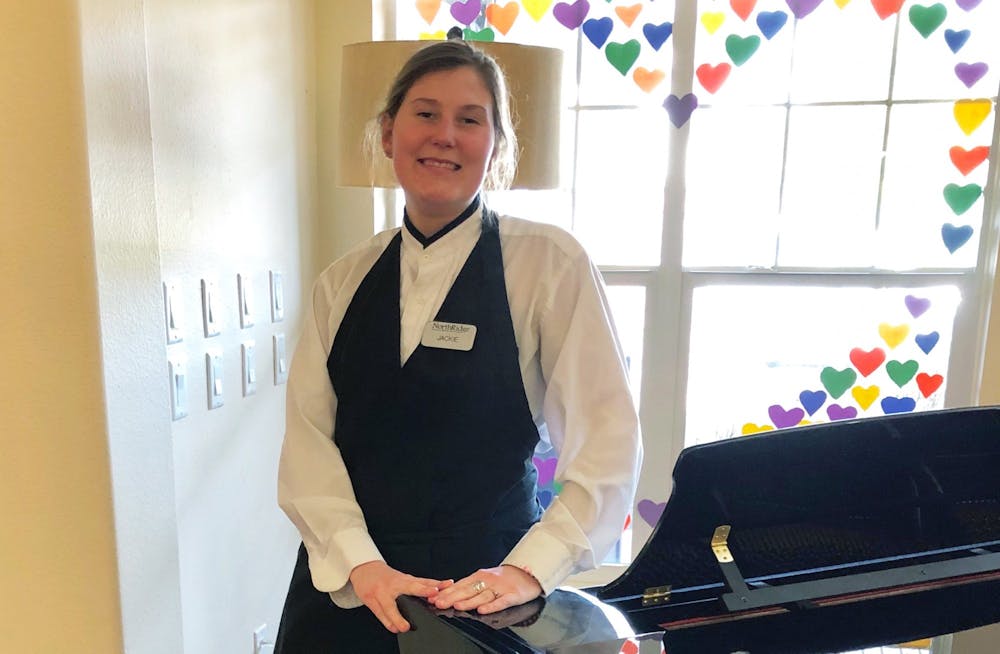A normal day at Jaclyn Klinger’s and Katelynn Buchan’s part-time serving jobs at a senior living facility once consisted of waiting tables, busing plates and cleaning up the dining area between meals.
Klinger and Buchan’s new normal at Northridge Gracious Retirement Living in Fishers, Indiana, now includes delivering meals door-to-door on all three floors clad in gloves and a mask. After food delivery, they sanitize the building.
When they’re done with work, they throw their masks and gloves away, wash their hands and head home.
Before the COVID-19 pandemic, the two college students would have driven home to their families. Now, Klinger walks upstairs from the Northridge lobby to her small apartment on the second floor and Buchan goes slightly farther to her studio apartment on the third.
Due to COVID-19, Northridge asked college students Klinger, 19, and Buchan, 21, to move out of their family homes and temporarily live in the facility to keep it from getting to the residents. Klinger’s mother is an essential worker, a nurse at Riverview Hospital in Noblesville, Indiana, who could be exposed to COVID-19 daily. Buchan’s mother, a banker, is also an essential worker.
Nursing home and senior living facility employees are battling on the front lines of the COVID-19 pandemic, as long-term care facilities house the people most susceptible to contracting the virus.
Employees such as Klinger and Buchan are sacrificing their homes, their health and any sense of normalcy to make sure seniors are receiving the care they need.
“I'm here, I'm working a bunch anyway,” Klinger said. “If I live here then I know I won't get sick.”
Klinger feels as if her life has been uprooted. She had to move out of her dorm at Hope College in early March after her school moved to online classes and then moved out of her family home in Noblesville on March 24. In less than a month, she went from living with a roommate or with her family to living alone.
Klinger is a freshman instrumental music education major at Hope College in Holland, Michigan. Now, she only plays her french horn from 10-11 a.m. during the week after her 8:30 a.m keyboard class.
“I'm allowed to use the piano that's in the front of the building,” Klinger said. “Everyone watches me play.”
Klinger said she is trying to maintain a sense of normalcy. She goes to work. She takes days off. She attends her classes online at the designated times. She tries to be a normal 19-year-old college student.
Buchan, a junior, went from being a full-time student at Hanover College and living on campus to working seven days a week at Northridge since March 20.
“Tuesday and Thursday are my days off, but I still do snack carts,” Buchan said. “So I actually haven't had a complete day off.”
Buchan said she is struggling to balance school and work. She said it is hard to get everything done without the structure living on a college provides.
“I just kind of go with the flow and hope I turn everything in,” Buchan said.
Despite the challenges of living at Northridge, Buchan said it’s not all bad. She has her dog, a bichon poodle mix named Poppy, and a family member in the building.
“My grandma lives here,” Buchan said. “She's really glad that I'm here with her because she has dementia.”
Buchan said she and her mother worry about her grandma not understanding the restrictions due to her dementia. Buchan said she helps her grandma cope with the new changes as they come.
Northridge’s lead manager Mike Lubinski said Klinger and Buchan voluntarily decided to live at Northridge after being asked, and they can move out at any time.
“Nothing is being held against any employee that is uncomfortable with coming to work,” Lubinski said.
Lubinski oversees day-to-day operations at Northridge. He said there have been drastic changes amid the COVID-19 pandemic, but protocols change everyday. There are no communal meals or group activities for the residents. Only privately hired caregivers and Northridge employees are allowed to come in and out of the building.
Northridge has about 120 residents living on the premises. Many residents of Northridge have cars and are accustomed to having unlimited freedom. They could go on walks, go shopping and come and go from the building anytime.
Now, residents are not allowed to leave the facility or have any visitors. The residents tell Klinger they live in a prison now.
“We're taking temperatures of everyone that comes in the front door,” Lubinski said.
Despite having no contact outside of Northridge, Klinger and Buchan have their temperatures taken every time they clock in for their shifts.
Klinger was able to help out more at Northridge due to her flexible online class schedule, so moving into the facility made her even more accessible, she said.
“I have a more flexible schedule and I'm in college, so I'm able to help out more,” Klinger said.
Klinger said she wishes she could be home with her family, but she knows this is what is best for the residents of the facility. She tries to stay busy to keep her mind off of how much her life has changed.
“I really don't mind living here,” Klinger said. “When I stay busy, I don't think about how I feel.”




